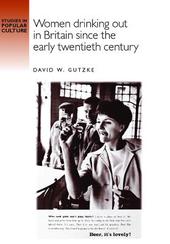
|
Women Drinking out in Britain Since the Early Twentieth Century
Paperback / softback
Main Details
| Title |
Women Drinking out in Britain Since the Early Twentieth Century
|
| Authors and Contributors |
By (author) David Gutzke
|
| Series | Studies in Popular Culture |
|---|
| Physical Properties |
| Format:Paperback / softback | | Pages:304 | | Dimensions(mm): Height 234,Width 156 |
|
| Category/Genre | British and Irish History |
|---|
| ISBN/Barcode |
9780719052651
|
| Classifications | Dewey:394.1308209410904 |
|---|
| Audience | | Professional & Vocational | |
|---|
| Illustrations |
Tables, black & white|Illustrations, black & white|Graphs
|
|
Publishing Details |
| Publisher |
Manchester University Press
|
| Imprint |
Manchester University Press
|
| Publication Date |
20 September 2015 |
| Publication Country |
United Kingdom
|
Description
Given recent media coverage of women's drinking habits, it is surprising that a topic of such interest has not produced a comprehensive examination. This book provides not just a survey spanning a century of momentous change, but integrates diverse sources with concepts to offer a new understanding of the changing nature of women's drinking patterns. It challenges traditional assumptions and offers original interpretations about the diverse factors influencing women's consumption of alcohol, including advertising, moral panics, sexism, legislative initiatives, employment, age, ethnicity, technology, new drinking venues and marketing strategies. What most influenced how women transformed their consumption of alcohol? What beverages did they drink? To what extent did women themselves act as agents of change? These and other questions serve as the basis for analysing women's drinking patterns from a social and cultural perspective. Close attention is also paid to the image of drinking projected in advertising, the mass media and films. -- .
Author Biography
David W. Gutzke is Professor of Modern British History at Missouri State University -- .
ReviewsAlthough some useful articles have been written about women drinking in public places, this book by historian David Gutzke is a welcome addition to the rather limited historiography. ... provides a good synthesis of a wide variety of sources, and Gutzke shows sensitivity for the inner workings of cultural processes. To scholars of either gender or food and drink history, the book should prove a very useful addition to the existing literature., Jon Verriet, Vrije Universiteit Brussel, Tijdschrift voor Sociale en Economische Geschiedenis 11/3 (2014): 194-196, 7 February 2015 'Women Drinking Out in Britain offers a carefully researched and for the most part convincingly argued account of how the alcohol industry has responded to women as customers. Gutzke's efforts to address the post-war period, so far largely neglected by historians of women and alcohol, make it a particularly valuable and timely contribution, as does his attention to the striking similarities between drunkenness in Edwardian England and present-day patterns of 'binge drinking'. He impressively crafts a background against which researchers can begin to bring in the voices, understandings and experiences of the women who have lived through and navigated some of the changes described.' Laura Fenton, University of Manchester, Women's History Review, 2016 'Both for the context it provides for local research and for its detailed and readable account of a key area of social history, this book is warmly recommended.' Paul Jennings, Local Historian 47, No. 2, April 2017 'Riding a rising tide of recent research on women in alcohol history, David Gutzke's Women Drinking Out provides an expansive, innovative and occasionally provocative overview of female public drinking (and the lack thereof) across the twentieth century. Exhaustively researched and passionately written, it attempts to both re-evaluate women's role in pubs in the first half of the twentieth century and provide a historical perspective on female disillusionment with traditional drinking venues from the 1950s onwards.' Richard Robinson, University of Helsinki, Social History of Alcohol and Drugs, Vol. 29, 2015 -- .
|